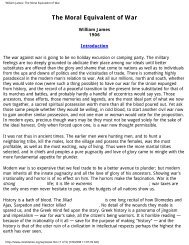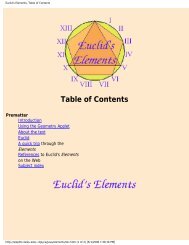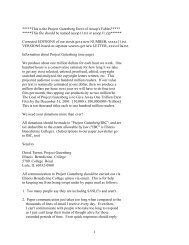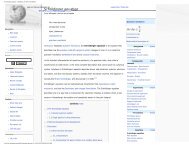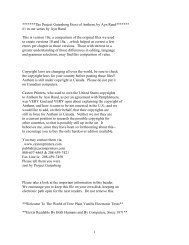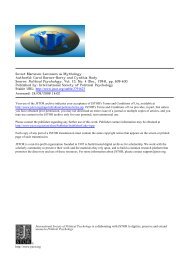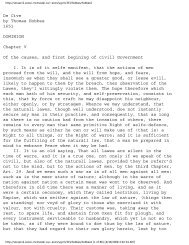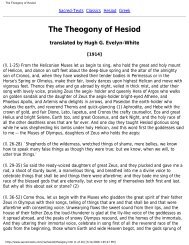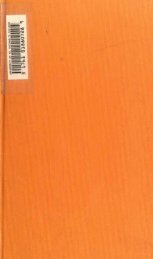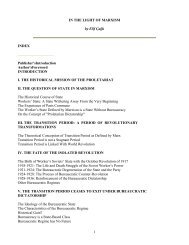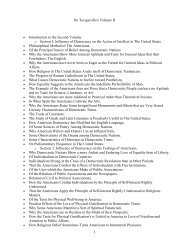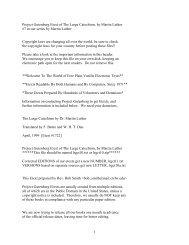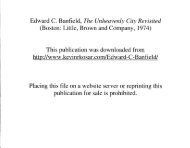Thomas Jefferson: A Manual of Parliamentary Practice
Thomas Jefferson: A Manual of Parliamentary Practice
Thomas Jefferson: A Manual of Parliamentary Practice
You also want an ePaper? Increase the reach of your titles
YUMPU automatically turns print PDFs into web optimized ePapers that Google loves.
<strong>Thomas</strong> <strong>Jefferson</strong>: A <strong>Manual</strong> <strong>of</strong> <strong>Parliamentary</strong> <strong>Practice</strong><br />
On this head the following case occurred in Senate, March 6, 1800. A resolution, which had no<br />
preamble, having been already amended by the House, so that a few words only <strong>of</strong> the<br />
original remained in it, a motion was made to prefix a preamble, which having an aspect very<br />
different from the resolution, the mover intimated that he should afterwards propose a<br />
correspondent amendment in the body <strong>of</strong> the resolution. It was objected that a preamble<br />
could not be taken up till the body <strong>of</strong> the resolution is done with. But the preamble was<br />
received: because we are in fact through the body <strong>of</strong> the resolution, we have amended that as<br />
far as amendments have been <strong>of</strong>fered, and indeed till little <strong>of</strong> the original is left. It is the<br />
proper time, therefore, to consider a preamble: and whether the one <strong>of</strong>fered be consistent<br />
with the resolution, is for the House to determine. The mover indeed, has intimated, that he<br />
shall <strong>of</strong>fer a subsequent proposition for the body <strong>of</strong> the resolution; but the House is not in<br />
possession <strong>of</strong> it; it remains in his breast, and may be withheld. The rules <strong>of</strong> the House can<br />
only operate on what is before them. The practice <strong>of</strong> the Senate too, allows recurrences<br />
backwards and forwards, for the purposes <strong>of</strong> amendment, not permitting<br />
amendments in a subsequent, to preclude those in a prior part, or e converso.<br />
When the committee is through the whole, a member moves that the committee may rise, and<br />
the chairman report the paper to the House, with, or without amendments, as the case may<br />
be. 2 Hats. 289, 292. Scob. 53. 2 Hats. 290. 8 Scob. 50.<br />
When a vote is once passed in a committee, it cannot be altered but by the House, their votes<br />
being binding on themselves. 1607, June 4.<br />
The committee may not erase, interline, or blot the bill itself; but must in a paper by itself, set<br />
down the amendments, stating the words which are to be inserted or omitted; Scob. 50. and<br />
where, by references to the page, line and word <strong>of</strong> the bill. Scob. 50.<br />
SEC. XXVII.<br />
REPORT OF COMMITTEE.<br />
THE chairman <strong>of</strong> the committee, standing in his place, informs the House, that the committee,<br />
to whom was referred such a bill, have, according to order, had the same under consideration,<br />
and have directed him to report the same without any amendment, or with sundry<br />
amendments, (as the case may be,) which he is ready to do, when the House pleases to<br />
receive it. And he, or any other, may move that it be now received. But the cry <strong>of</strong> "now, now,"<br />
from the House, generally dispenses with the formality <strong>of</strong> a motion and question. He then<br />
reads the amendments with the coherence in the bill, and opens the alterations, and the<br />
reasons <strong>of</strong> the committee for such amendments, until he has gone through the whole. He then<br />
delivers it at the clerk's table, where the amendments reported are read by the clerk, without<br />
the coherence, whereupon the papers lie on the table, till the House at its convenience, shall<br />
take up the report. Scob. 52. Hakew. 148.<br />
http://www.constitution.org/tj/tj-mpp.htm (30 <strong>of</strong> 70) [4/14/2008 6:37:46 PM]



